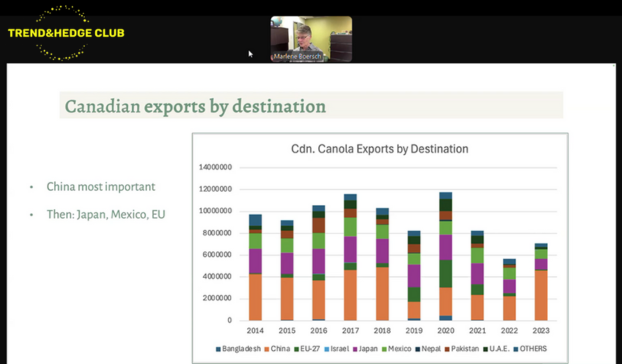
Canola now accounts for 23% of global production, with Canada holding 47% of the global export share. The domestic crush has also grown, hitting a record 11 MMT in 2023/24 MY, driven by high margins and an expanding crush infrastructure, including new plants like Cargill’s scheduled for 2025, said Marlene Boersch, with Mercantile Consulting Venture, at the Trend&Hedge Club on 16 October.
China remains one of Canada’s most critical canola markets. While Canadian exports have generally declined over the past four years, China continues to buy Canadian canola when prices are competitive with soybeans. However, recent political frictions have introduced uncertainty. China hinted at possible retaliation following Canada’s restrictions on electric vehicles, though analysts of Mercantile Consulting Venture believe a direct canola ban is unlikely due to the crop’s pricing advantage over soy in the Chinese market.
In addition to China, the European Union offers growing market potential for Canadian canola, particularly for biodiesel production. Despite concerns over genetically modified (GM) crops, Canadian canola found a foothold in the EU, with exports reaching 2.5 MMT in 2020. Favorable crude oil prices and competitive freight costs suggest Canada will maintain its presence in the European market moving forward.
At the same time, the current MY presents mixed signals. While exports have accelerated, Canadian crushers have increased storage to ensure they maintain supply for domestic production. With crush margins high, crushers may prioritize processing over exports, potentially tightening the market.
Ending stocks are projected between 3 and 3.3 MMT, providing a 13% stock-use ratio—manageable but not excessive. This delicate balance between export and crush activity will shape the market trajectory, with the possibility of constrained exports later in the season as crushers compete for supply.
Despite the volatility, Canada is off to a promising start in 2024/25 export season, supported by strong early shipments. Political developments, particularly regarding China, will remain a critical factor for the canola market. While geopolitical risks loom, high crush capacity and growing European demand provide Canada with strategic buffers against potential disruptions in Chinese trade.





Прокоментувати